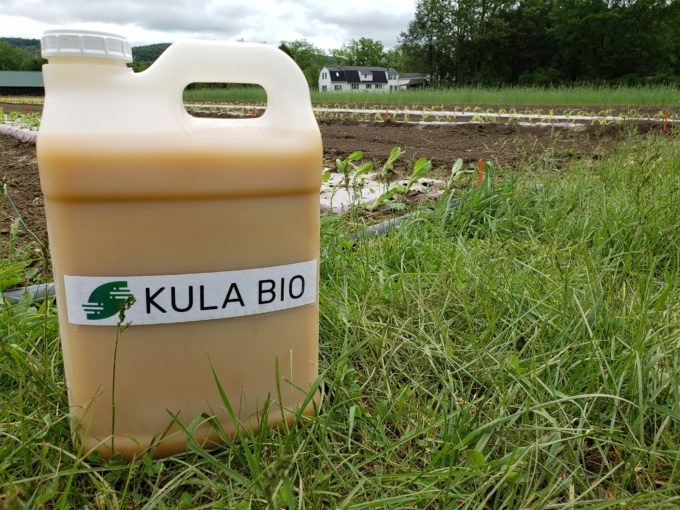If you’re a farmer, you have two mediocre fertilizer options. You can go with a conventional fertilizer—which is inexpensive and precise, but contaminates water and involves a production process with significant greenhouse gas emissions. Or, you can go the organic fertilizer route—which is better for the environment, but is expensive and has unpredictable yields.
Kula Bio has created a third, new option. Its microbial fertilizer fixes nitrogen (moves nitrogen from the air to the soil) so that plants can use it as food. This solution offers equivalent yield and price to conventional fertilizers, but includes the environmental benefits of organic fertilizers. It also works on a wide range of crops.
“We have all the benefits of an organic fertilizer, with cost competitiveness to the farmer of a conventional fertilizer,” says Kula Bio Co-founder and Science Director Kelsey Sakimoto. “Our fertilizer also fits within the normal practices of conventional agriculture. In several greenhouse and outdoor farm trials, we’ve been able to replace 50 to 100 percent of conventional nitrogen fertilizer and reach the same yields as the conventional treatments.”
Kula Bio’s technology also boosts soil health, according to its team, helping farmers treat their land responsibly.
“One of the big features of this product is that it adds a big source of carbon to the soil,” Sakimoto explains. “Every ecologist you talk to will say that is the cornerstone way to start improving soil health. If you add carbon, it adds a food source, and nothing can grow in the soil unless there’s a food source.”
Sakimoto had long been interested in combining biology and chemistry to create impactful solutions. He completed a postdoctoral fellowship at Harvard, where he met his future co-founders, Bill Brady and Professor Daniel Nocera. While at Harvard, the founding team was able to test its technology at the university’s extensive Arnold Arboretum. They spun out Kula Bio in the summer of 2018.
From there, the team spent a few months planning and trying to find the right workspace. They needed a place where they could do biology, chemistry, prototyping, and office work.
“We had a hard time trying to identify spaces that suited all of our needs,” Sakimoto says. The Greater Boston area is well set up for biomedicine and pharmaceuticals, so we looked at those types of spaces, but there’s no space to build anything. There are a lot of places that are more mechanical and physical, but we still need to be able to do chemistry and biology. So Greentown is a very unique resource. We do a lot of fabrication and building, we use the machine shop, we use the electronics shop, we use the 3D printers a lot. And our work is inherently biological and chemical so we need the wet lab as well. There was an option to split us up among different sites, but as a small team, it’s helpful to have us all together.”
Kula Bio joined Greentown in October 2018, and utilizes the incubator’s 26-bench wet lab to conduct analytical chemistry and microbiology, which the team then scales up in the prototyping lab.
The company raised its seed round last year, and will spend 2020 conducting field trials with California farmers. In 2021, Kula Bio aims to start early commercial sales, according to Sakimoto. The company has also begun exploring other microbes that could help farmers in a variety of ways, including removing contaminants from soil.
Greentown Labs is a community of bold, passionate entrepreneurs creating solutions for today’s biggest climate and environmental challenges. Located in Somerville, Mass., Greentown Labs is the largest cleantech incubator in North America, operating a 100,000 sq. ft. campus comprised of prototyping and wet lab space, shared office space, a machine shop, electronics lab, and a curated suite of programs and resources. Greentown Labs is home to more than 100 startups and has supported more than 250 since its inception.


